- Home
- Herman Melville
The Piazza Tales Page 13
The Piazza Tales Read online
Page 13
"But tell me, has he not, so far as you have [pg 213]
known him, always proved a good, worthy fellow?" said Captain Delano, pausing, while with a final genuflexion the steward disappeared into the cabin; "come, for the reason just mentioned, I am curious to know."
"Francesco is a good man," a sort of sluggishly responded Don Benito, like a phlegmatic appreciator, who would neither find fault nor flatter.
"Ah, I thought so. For it were strange, indeed, and not very creditable to us white-skins, if a little of our blood mixed with the African's, should, far from improving the latter's quality, have the sad effect of pouring vitriolic acid into black broth; improving the hue, perhaps, but not the wholesomeness."
"Doubtless, doubtless, Seсor, but"-glancing at Babo-"not to speak of negroes, your planter's remark I have heard applied to the Spanish and Indian intermixtures in our provinces. But I know nothing about the matter," he listlessly added.
And here they entered the cabin.
The lunch was a frugal one. Some of Captain [pg 214]
Delano's fresh fish and pumpkins, biscuit and salt beef, the reserved bottle of cider, and the San Dominick's last bottle of Canary.
As they entered, Francesco, with two or three colored aids, was hovering over the table giving the last adjustments. Upon perceiving their master they withdrew, Francesco making a smiling congй, and the Spaniard, without condescending to notice it, fastidiously remarking to his companion that he relished not superfluous attendance.
Without companions, host and guest sat down, like a childless married couple, at opposite ends of the table, Don Benito waving Captain Delano to his place, and, weak as he was, insisting upon that gentleman being seated before himself.
The negro placed a rug under Don Benito's feet, and a cushion behind his back, and then stood behind, not his master's chair, but Captain Delano's. At first, this a little surprised the latter. But it was soon evident that, in taking his position, the black was still true to his master; since by facing him he could the more readily anticipate his slightest want. [pg 215]
"This is an uncommonly intelligent fellow of yours, Don Benito," whispered Captain Delano across the table.
"You say true, Seсor."
During the repast, the guest again reverted to parts of Don Benito's story, begging further particulars here and there. He inquired how it was that the scurvy and fever should have committed such wholesale havoc upon the whites, while destroying less than half of the blacks. As if this question reproduced the whole scene of plague before the Spaniard's eyes, miserably reminding him of his solitude in a cabin where before he had had so many friends and officers round him, his hand shook, his face became hueless, broken words escaped; but directly the sane memory of the past seemed replaced by insane terrors of the present. With starting eyes he stared before him at vacancy. For nothing was to be seen but the hand of his servant pushing the Canary over towards him. At length a few sips served partially to restore him. He made random reference to the different constitution of races, enabling one to offer more resistance to certain [pg 216]
maladies than another. The thought was new to his companion.
Presently Captain Delano, intending to say something to his host concerning the pecuniary part of the business he had undertaken for him, especially-since he was strictly accountable to his owners-with reference to the new suit of sails, and other things of that sort; and naturally preferring to conduct such affairs in private, was desirous that the servant should withdraw; imagining that Don Benito for a few minutes could dispense with his attendance. He, however, waited awhile; thinking that, as the conversation proceeded, Don Benito, without being prompted, would perceive the propriety of the step.
But it was otherwise. At last catching his host's eye, Captain Delano, with a slight backward gesture of his thumb, whispered, "Don Benito, pardon me, but there is an interference with the full expression of what I have to say to you."
Upon this the Spaniard changed countenance; which was imputed to his resenting the hint, as in some way a reflection upon his servant. [pg 217]
After a moment's pause, he assured his guest that the black's remaining with them could be of no disservice; because since losing his officers he had made Babo (whose original office, it now appeared, had been captain of the slaves) not only his constant attendant and companion, but in all things his confidant.
After this, nothing more could be said; though, indeed, Captain Delano could hardly avoid some little tinge of irritation upon being left ungratified in so inconsiderable a wish, by one, too, for whom he intended such solid services. But it is only his querulousness, thought he; and so filling his glass he proceeded to business.
The price of the sails and other matters was fixed upon. But while this was being done, the American observed that, though his original offer of assistance had been hailed with hectic animation, yet now when it was reduced to a business transaction, indifference and apathy were betrayed. Don Benito, in fact, appeared to submit to hearing the details more out of regard to common propriety, than from any [pg 218]
impression that weighty benefit to himself and his voyage was involved.
Soon, his manner became still more reserved. The effort was vain to seek to draw him into social talk. Gnawed by his splenetic mood, he sat twitching his beard, while to little purpose the hand of his servant, mute as that on the wall, slowly pushed over the Canary.
Lunch being over, they sat down on the cushioned transom; the servant placing a pillow behind his master. The long continuance of the calm had now affected the atmosphere. Don Benito sighed heavily, as if for breath.
"Why not adjourn to the cuddy," said Captain Delano; "there is more air there." But the host sat silent and motionless.
Meantime his servant knelt before him, with a large fan of feathers. And Francesco coming in on tiptoes, handed the negro a little cup of aromatic waters, with which at intervals he chafed his master's brow; smoothing the hair along the temples as a nurse does a child's. He spoke no word. He only rested his eye on his master's, as if, amid all Don Benito's distress, [pg 219]
a little to refresh his spirit by the silent sight of fidelity.
Presently the ship's bell sounded two o'clock; and through the cabin windows a slight rippling of the sea was discerned; and from the desired direction.
"There," exclaimed Captain Delano, "I told you so, Don Benito, look!"
He had risen to his feet, speaking in a very animated tone, with a view the more to rouse his companion. But though the crimson curtain of the stern-window near him that moment fluttered against his pale cheek, Don Benito seemed to have even less welcome for the breeze than the calm.
Poor fellow, thought Captain Delano, bitter experience has taught him that one ripple does not make a wind, any more than one swallow a summer. But he is mistaken for once. I will get his ship in for him, and prove it.
Briefly alluding to his weak condition, he urged his host to remain quietly where he was, since he (Captain Delano) would with pleasure take upon himself the responsibility of making the best use of the wind. [pg 220]
Upon gaining the deck, Captain Delano started at the unexpected figure of Atufal, monumentally fixed at the threshold, like one of those sculptured porters of black marble guarding the porches of Egyptian tombs.
But this time the start was, perhaps, purely physical. Atufal's presence, singularly attesting docility even in sullenness, was contrasted with that of the hatchet-polishers, who in patience evinced their industry; while both spectacles showed, that lax as Don Benito's general authority might be, still, whenever he chose to exert it, no man so savage or colossal but must, more or less, bow.
Snatching a trumpet which hung from the bulwarks, with a free step Captain Delano advanced to the forward edge of the poop, issuing his orders in his best Spanish. The few sailors and many negroes, all equally pleased, obediently set about heading the ship towards the harbor.
While giving some directions about setting a lower stu'
n'-sail, suddenly Captain Delano heard a voice faithfully repeating his orders. Turning, he saw Babo, now for the time acting, [pg 221]
under the pilot, his original part of captain of the slaves. This assistance proved valuable. Tattered sails and warped yards were soon brought into some trim. And no brace or halyard was pulled but to the blithe songs of the inspirited negroes.
Good fellows, thought Captain Delano, a little training would make fine sailors of them. Why see, the very women pull and sing too. These must be some of those Ashantee negresses that make such capital soldiers, I've heard. But who's at the helm. I must have a good hand there.
He went to see.
The San Dominick steered with a cumbrous tiller, with large horizontal pullies attached. At each pully-end stood a subordinate black, and between them, at the tiller-head, the responsible post, a Spanish seaman, whose countenance evinced his due share in the general hopefulness and confidence at the coming of the breeze.
He proved the same man who had behaved with so shame-faced an air on the windlass.
"Ah, — it is you, my man," exclaimed Captain Delano-"well, no more sheep's-eyes now;-look [pg 222]
straight forward and keep the ship so. Good hand, I trust? And want to get into the harbor, don't you?"
The man assented with an inward chuckle, grasping the tiller-head firmly. Upon this, unperceived by the American, the two blacks eyed the sailor intently.
Finding all right at the helm, the pilot went forward to the forecastle, to see how matters stood there.
The ship now had way enough to breast the current. With the approach of evening, the breeze would be sure to freshen.
Having done all that was needed for the present, Captain Delano, giving his last orders to the sailors, turned aft to report affairs to Don Benito in the cabin; perhaps additionally incited to rejoin him by the hope of snatching a moment's private chat while the servant was engaged upon deck.
From opposite sides, there were, beneath the poop, two approaches to the cabin; one further forward than the other, and consequently communicating with a longer passage. Marking the servant still above, Captain Delano, [pg 223]
taking the nighest entrance-the one last named, and at whose porch Atufal still stood-hurried on his way, till, arrived at the cabin threshold, he paused an instant, a little to recover from his eagerness. Then, with the words of his intended business upon his lips, he entered. As he advanced toward the seated Spaniard, he heard another footstep, keeping time with his. From the opposite door, a salver in hand, the servant was likewise advancing.
"Confound the faithful fellow," thought Captain Delano; "what a vexatious coincidence."
Possibly, the vexation might have been something different, were it not for the brisk confidence inspired by the breeze. But even as it was, he felt a slight twinge, from a sudden indefinite association in his mind of Babo with Atufal.
"Don Benito," said he, "I give you joy; the breeze will hold, and will increase. By the way, your tall man and time-piece, Atufal, stands without. By your order, of course?"
Don Benito recoiled, as if at some bland satirical touch, delivered with such adroit garnish [pg 224]
of apparent good breeding as to present no handle for retort.
He is like one flayed alive, thought Captain Delano; where may one touch him without causing a shrink?
The servant moved before his master, adjusting a cushion; recalled to civility, the Spaniard stiffly replied: "you are right. The slave appears where you saw him, according to my command; which is, that if at the given hour I am below, he must take his stand and abide my coming."
"Ah now, pardon me, but that is treating the poor fellow like an ex-king indeed. Ah, Don Benito," smiling, "for all the license you permit in some things, I fear lest, at bottom, you are a bitter hard master."
Again Don Benito shrank; and this time, as the good sailor thought, from a genuine twinge of his conscience.
Again conversation became constrained. In vain Captain Delano called attention to the now perceptible motion of the keel gently cleaving the sea; with lack-lustre eye, Don Benito returned words few and reserved. [pg 225]
By-and-by, the wind having steadily risen, and still blowing right into the harbor bore the San Dominick swiftly on. Sounding a point of land, the sealer at distance came into open view.
Meantime Captain Delano had again repaired to the deck, remaining there some time. Having at last altered the ship's course, so as to give the reef a wide berth, he returned for a few moments below.
I will cheer up my poor friend, this time, thought he.
"Better and better," Don Benito, he cried as he blithely re-entered: "there will soon be an end to your cares, at least for awhile. For when, after a long, sad voyage, you know, the anchor drops into the haven, all its vast weight seems lifted from the captain's heart. We are getting on famously, Don Benito. My ship is in sight. Look through this side-light here; there she is; all a-taunt-o! The Bachelor's Delight, my good friend. Ah, how this wind braces one up. Come, you must take a cup of coffee with me this evening. My old steward will give you as fine a cup as ever any sultan [pg 226]
tasted. What say you, Don Benito, will you?"
At first, the Spaniard glanced feverishly up, casting a longing look towards the sealer, while with mute concern his servant gazed into his face. Suddenly the old ague of coldness returned, and dropping back to his cushions he was silent.
"You do not answer. Come, all day you have been my host; would you have hospitality all on one side?"
"I cannot go," was the response.
"What? it will not fatigue you. The ships will lie together as near as they can, without swinging foul. It will be little more than stepping from deck to deck; which is but as from room to room. Come, come, you must not refuse me."
"I cannot go," decisively and repulsively repeated Don Benito.
Renouncing all but the last appearance of courtesy, with a sort of cadaverous sullenness, and biting his thin nails to the quick, he glanced, almost glared, at his guest, as if impatient that a stranger's presence should interfere with the [pg 227]
full indulgence of his morbid hour. Meantime the sound of the parted waters came more and more gurglingly and merrily in at the windows; as reproaching him for his dark spleen; as telling him that, sulk as he might, and go mad with it, nature cared not a jot; since, whose fault was it, pray?
But the foul mood was now at its depth, as the fair wind at its height.
There was something in the man so far beyond any mere unsociality or sourness previously evinced, that even the forbearing good-nature of his guest could no longer endure it. Wholly at a loss to account for such demeanor, and deeming sickness with eccentricity, however extreme, no adequate excuse, well satisfied, too, that nothing in his own conduct could justify it, Captain Delano's pride began to be roused. Himself became reserved. But all seemed one to the Spaniard. Quitting him, therefore, Captain Delano once more went to the deck.
The ship was now within less than two miles of the sealer. The whale-boat was seen darting over the interval. [pg 228]
To be brief, the two vessels, thanks to the pilot's skill, ere long neighborly style lay anchored together.
Before returning to his own vessel, Captain Delano had intended communicating to Don Benito the smaller details of the proposed services to be rendered. But, as it was, unwilling anew to subject himself to rebuffs, he resolved, now that he had seen the San Dominick safely moored, immediately to quit her, without further allusion to hospitality or business. Indefinitely postponing his ulterior plans, he would regulate his future actions according to future circumstances. His boat was ready to receive him; but his host still tarried below. Well, thought Captain Delano, if he has little breeding, the more need to show mine. He descended to the cabin to bid a ceremonious, and, it may be, tacitly rebukeful adieu. But to his great satisfaction, Don Benito, as if he began to feel the weight of that treatment with which his slighted guest had, not indecorously, retaliated upon
him, now supported by his servant, rose to his feet, and grasping Captain Delano's hand, stood tremulous; too much agitated to [pg 229]
speak. But the good augury hence drawn was suddenly dashed, by his resuming all his previous reserve, with augmented gloom, as, with half-averted eyes, he silently reseated himself on his cushions. With a corresponding return of his own chilled feelings, Captain Delano bowed and withdrew.
He was hardly midway in the narrow corridor, dim as a tunnel, leading from the cabin to the stairs, when a sound, as of the tolling for execution in some jail-yard, fell on his ears. It was the echo of the ship's flawed bell, striking the hour, drearily reverberated in this subterranean vault. Instantly, by a fatality not to be withstood, his mind, responsive to the portent, swarmed with superstitious suspicions. He paused. In images far swifter than these sentences, the minutest details of all his former distrusts swept through him.
Hitherto, credulous good-nature had been too ready to furnish excuses for reasonable fears. Why was the Spaniard, so superfluously punctilious at times, now heedless of common propriety in not accompanying to the side his departing guest? Did indisposition forbid? [pg 230]
Indisposition had not forbidden more irksome exertion that day. His last equivocal demeanor recurred. He had risen to his feet, grasped his guest's hand, motioned toward his hat; then, in an instant, all was eclipsed in sinister muteness and gloom. Did this imply one brief, repentant relenting at the final moment, from some iniquitous plot, followed by remorseless return to it? His last glance seemed to express a calamitous, yet acquiescent farewell to Captain Delano forever. Why decline the invitation to visit the sealer that evening? Or was the Spaniard less hardened than the Jew, who refrained not from supping at the board of him whom the same night he meant to betray? What imported all those day-long enigmas and contradictions, except they were intended to mystify, preliminary to some stealthy blow? Atufal, the pretended rebel, but punctual shadow, that moment lurked by the threshold without. He seemed a sentry, and more. Who, by his own confession, had stationed him there? Was the negro now lying in wait?

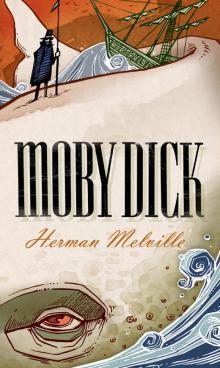 Moby Dick; Or, The Whale
Moby Dick; Or, The Whale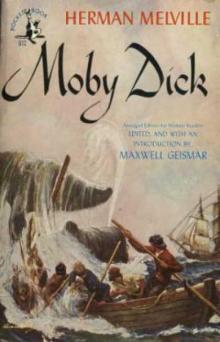 Moby Dick
Moby Dick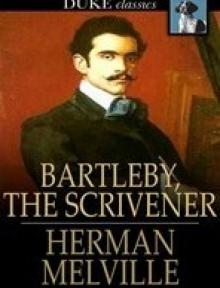 Benito Cereno and Bartleby the Scrivener
Benito Cereno and Bartleby the Scrivener Israel Potter: His Fifty Years of Exile (Annotated Edition)
Israel Potter: His Fifty Years of Exile (Annotated Edition) Billy Budd and the Piazza Tales
Billy Budd and the Piazza Tales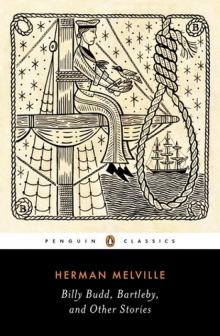 Billy Budd, Bartleby, and Other Stories
Billy Budd, Bartleby, and Other Stories Typee: A Romance of the South Seas
Typee: A Romance of the South Seas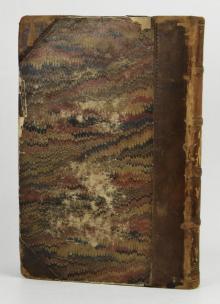 Omoo: Adventures in the South Seas
Omoo: Adventures in the South Seas White Jacket; Or, The World on a Man-of-War
White Jacket; Or, The World on a Man-of-War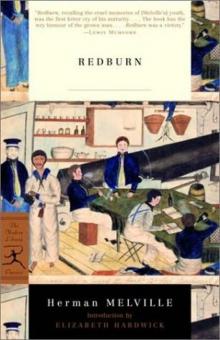 Redburn. His First Voyage
Redburn. His First Voyage Mardi: and A Voyage Thither, Vol. II
Mardi: and A Voyage Thither, Vol. II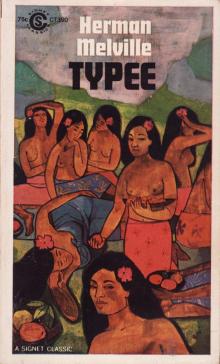 Typee
Typee The Paradise of Bachelors and the Tartarus of Maids
The Paradise of Bachelors and the Tartarus of Maids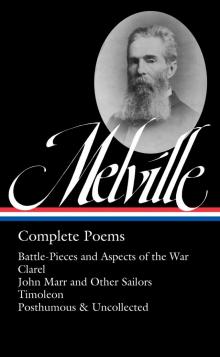 Herman Melville- Complete Poems
Herman Melville- Complete Poems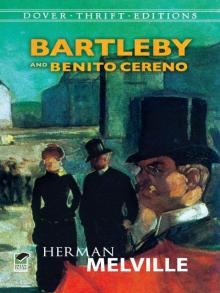 Bartleby and Benito Cereno
Bartleby and Benito Cereno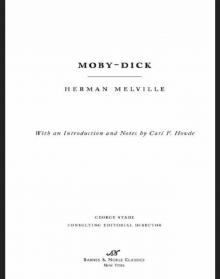 Moby-Dick (Barnes & Noble Classics Series)
Moby-Dick (Barnes & Noble Classics Series) Mardi and a Voyage Thither
Mardi and a Voyage Thither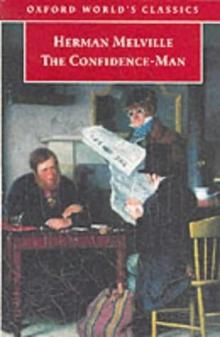 The Confidence-Man
The Confidence-Man Billy Budd and Other Stories
Billy Budd and Other Stories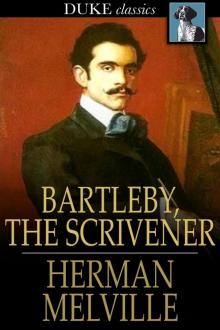 Bartleby the Scrivener
Bartleby the Scrivener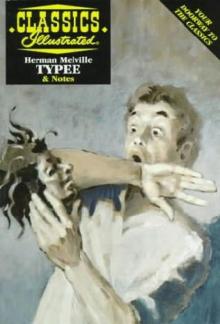 Typee: A Romance of the South Sea
Typee: A Romance of the South Sea I and My Chimney
I and My Chimney Billy Budd
Billy Budd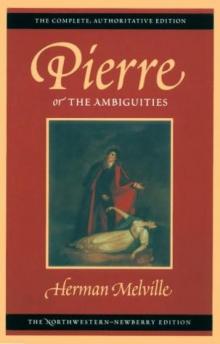 Pierre, Or the Ambiguities
Pierre, Or the Ambiguities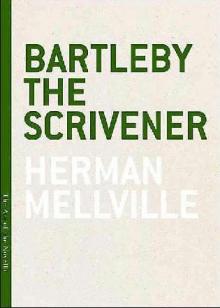 Bartleby, The Scrivener A Story of Wall-Street
Bartleby, The Scrivener A Story of Wall-Street Four Great American Classics
Four Great American Classics White Jacket or, The World on a Man-of-War
White Jacket or, The World on a Man-of-War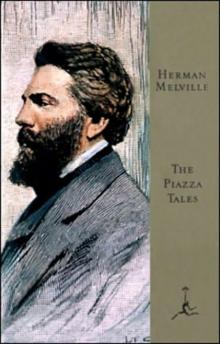 The Piazza Tales
The Piazza Tales Israel Potter. Fifty Years of Exile
Israel Potter. Fifty Years of Exile